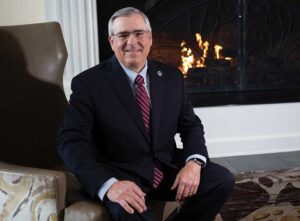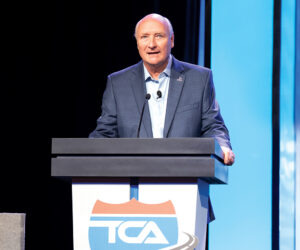In his acceptance speech at Truckload: 2020 in Kissimmee, Florida, Truckload Carriers Association Chairman Dennis Dellinger called on association members to get involved with this challenge: “Any member of an association, and especially its incoming chairman, should want the collective group to be involved,” he said. They did so, but in a way no one could have imagined at the time. Within days, the COVID-19 pandemic changed everything. Suddenly, “conference calls” and “Zoom” became household words for businesses and associations in U.S. and Canada.
Through it all, TCA kept moving forward without a glitch. In-person meetings pivoted to a virtual environment, and with great success. In the past year, attendance at TCA’s virtual meetings far exceeded attendance at in-person meetings. Educational programs and online workshops were added. More and more Highway Angels were honored. More than $150,000 in scholarships was awarded to students associated with the trucking industry. In this, his final Chat With the Chairman, Dellinger speaks further about the accomplishments of the association the past year and talks about challenges facing the industry under the Biden administration, and concludes with a word of commendation for incoming TCA Chairman Jim Ward.
Mr. Chairman, thank you for joining us for the last of your Chat with the Chairman interviews. The year has gone by quickly. What have been TCA’s major accomplishments during the past year?
The TCA staff has continued to work hard behind the scenes to carry out the work of the association during this unusual year. First and foremost, it was deemed necessary to conduct a survey to gather input from the membership to chart direction for future years. The responses helped to substantiate direction and gave ideas for consideration as well. Supporting the notion that TCA should be the voice of truckload, it was important to achieve some sense of funding stability for government affairs, which resulted in a dues increase. TCA has become a respected source of information on regulations issued by Congress and the Federal Motor Carrier Safety Administration (FMCSA) by continuing to comment on meaningful rulemakings, and by TCA’s Vice President of Government Affairs David Heller being appointed to FMCSA’s Motor Carrier Safety Advisory Committee. Our outreach and communications efforts have seen record numbers of people participating in image programs, awards, webinars, and virtual meetings. And to assure continuity, TCA continues to improve upon the transition of leadership, reviewing objectives and items that remain open from one year to another.
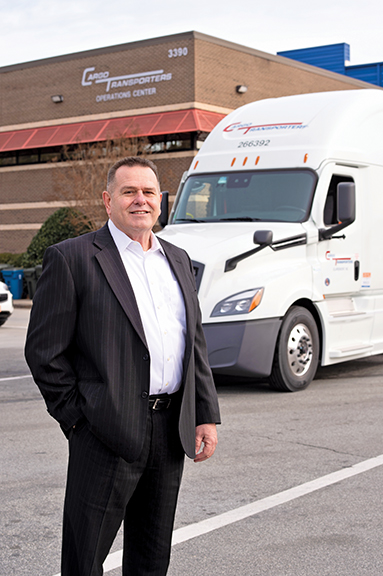 What achievement makes you the most proud?
What achievement makes you the most proud?
As I reflect on the past year, I am most proud of the work the association has continued despite the interruptions brought about by COVID-19. Under normal circumstances this would be an expectation for both staff and leadership, but, as we all know, this past year has been anything but normal. With the trucking industry being deemed essential early on in the pandemic, it was imperative the association be there to support its membership and the industry as a whole. I am so appreciative and grateful for the staff and officers I worked alongside during these unprecedented times that not only recognized but supported the mission. I am reminded, sometimes it’s the little things in life that matter the most.
What has been your biggest frustration?
I’m not sure I want to label it as a frustration, but I will say that failure to have in-person meetings at TCA has been an inconvenience to my platform that was shared in March 2020. I have missed seeing my friends and peers in the industry to collaborate and network. Please understand, I am not complaining, as others have experienced much greater inconveniences and life-changing events, including loss of loved ones, during this pandemic. I may have been inconvenienced, but I know it is your health and safety that has greater importance.
In addition to your chairmanship, what has been your view of the association during the time you spent as an officer?
I was fortunate to spend time co-chairing TCA’s Communications & Image Policy Committee prior to joining the officer group. After becoming an officer at-large, I continued to support the aforementioned behind some strong and dedicated individuals. Desiring to become more involved, I served two years as treasurer, learning more about the finances of the association, followed by the roles of second and first vice chair. Every role was a stepping stone preparing me for this past year. I am so thankful for those that helped me along the way and supported my journey.
As you complete your term, a new administration has taken over in Washington. This year marks the first time since the 111th Congress (2009-2011) that the White House and both Houses of Congress have been controlled by the Democratic Party. What are the most important issues the Biden administration will need to address over the next two years?
I believe the most important issue for the Biden administration to address is the passage of an infrastructure bill to replace the FAST Act. This issue was part of the 2016 election, and we have yet to realize meaningful legislation to improve our nation’s highways. Infrastructure is not one sole issue, but rather an all-encompassing platform made up of pieces that address many aspects of our industry. The safety issues alone appearing in the version voted up in the House last year represented some interesting aspects of a bill about which we, as an industry, should not be shy about expressing our opinions. Safety technology will certainly come up, and discussions surrounding minimum insurance are likely as well. Demonstrated by the lack of movement so far, any infrastructure bill should not be viewed as an easy lift, but as an opportunity for our industry to methodically engage congressional leadership. We can further cement our issues with good data and proper facts.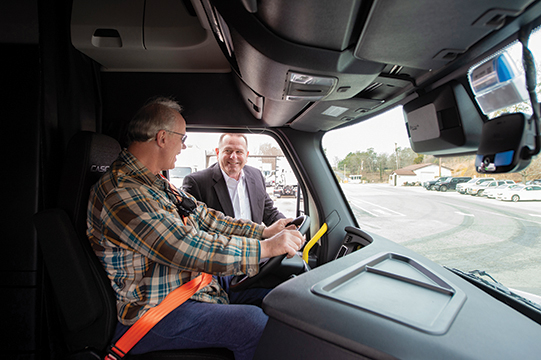
If the new administration can be successful in passing an infrastructure plan, that is only the beginning. Funding is the next step. The Highway Trust Fund may become insolvent this year. The majority of the trucking industry agrees that increasing the fuel tax is the best funding mechanism. What is TCA’s position on increasing the gas and diesel tax?
Funding such a large piece of legislation has proven to be a hard discussion that seems to never reach a conclusion. The Highway Trust Fund revenue amounted to $43 billion in fiscal year 2020. While that is a large number, it is well below the price tag to properly fund our current infrastructure needs. Federal fuel tax levels last increased in 1993, while construction costs have skyrocketed. TCA continues to support an increase in the federal fuel tax while indexing year over year, based on inflation, to achieve higher levels of funding. In fact, the federal fuel tax program represents a mechanism that contains the lowest administrative costs attributed to the collection and disbursement of funding. The monies collected via the fuel tax still stand out ahead of any current proposals for immediate results. It’s obvious there are many differing opinions and much discussion surrounding funding. Recognizing the Vehicle Miles Traveled (VMT) tax has become the hot topic with lawmakers. TCA’s Highway Policy Committee did a great job of putting together some recommended guidelines when engaging on Capitol Hill. It will be important that TCA and its membership remain open and not be shut out of any possible funding discussions.
As you leave office, the new hours-of-service rules have been in effect for almost 10 months. Based on what you’ve heard from members, what have been the most positive aspects of the new rule, and where might it be lacking?
The changes to the hours-of-service regulations allowing the 7/3 split to the sleeper berth and stopping the 14-hour clock were viewed as pivotal in providing flexibility for our drivers to address their workday. As we all know, daily problems such as detention, congestion, and other delays our professional truck drivers face wreak havoc on a driver’s schedule. Providing them with the opportunity to combat these issues represented a positive change to a rule that had shown itself, through electronic logging device (ELD) data, to be extremely restrictive. Incorporating flexibility has certainly been key to drivers becoming more efficient than they previously were. While we applaud the changes, the transition wasn’t as smooth as we might have hoped. Operating in the ELD environment, the changes took some time to get used to, and likewise adjust. Despite the real-world opportunities, the FMCSA has worked hard to educate the public and enforcement officials on these changes in an effort to make the transition as seamless as possible.
In what it calls an effort to provide more flexibility in the hours-of-service rule, the FMCSA is proposing a pilot program that would provide data about the benefits of 6/4 and 5/5 sleeper berth splits. Currently the allowable splits are 8/2 and 7/3. Would this be a positive change to the rule? Why?
I have to emphasize that this is merely a proposed pilot program put forth to collect meaningful data. There are some that would oppose this proposal or a final rulemaking, but the data generated by our ELDs has shown a need for increased flexibility. It is appropriate that we use the data provided to improve safety by removing restrictive measures, demonstrating to the driver workforce that an ELD is more than a compliance tool. Some will argue that flexibility increases the opportunity for one to drive while fatigued. We need to follow the data. Even with the recent changes, the average driving hours today fall short of the 11 allowed within the 14-hour workday to an average of six-and-a-half to seven hours. It just makes sense to move forward with this program to gather the data and weigh whether full flexibility is a viable option moving forward.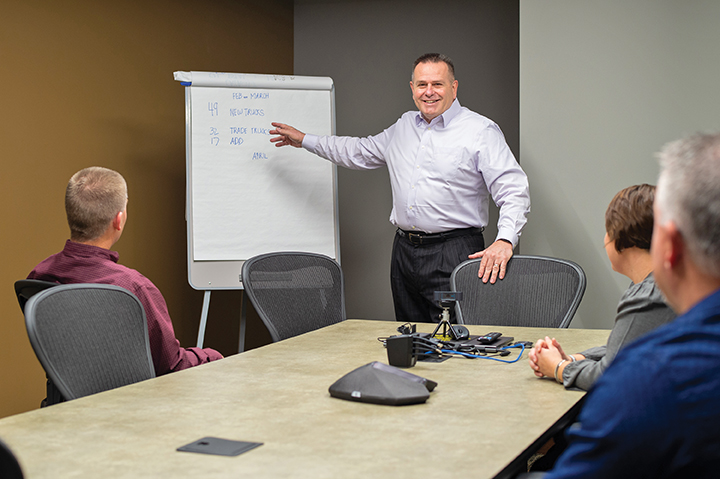
What is the status of the trucking industry’s effort to maintain the independent contractor business model since Proposition 22 passed comfortably in California during the November election?
The independent contractor business model is one our industry has used for decades. In fact, some of the largest truckload carriers started with just one truck. There are many carriers today that continue to implement successful programs for independent contractors to thrive in this industry. While there is always potential for misclassification, we are not sure whether the Biden administration will rescind the ruling recently issued by the Department of Labor, which better defines the term “independent contractor.” Regardless, TCA will continue to support the efforts of the California Trucking Association to exempt our industry from the restrictive AB5 law that we now see other states attempting to replicate. And finally, it is important to note, TCA commissioned a study through the University of Arkansas over 10 years ago to review the independent contractor concept as it relates to trucking. Overwhelmingly, drivers chose the independent contractor model to fulfill their vision of the “American Dream” as opposed to being forced into it. This is but another reason that we continue to support those independent contractors and the American Dream.
Many members don’t realize the sacrifices chairmen and officers make in the time spent away from their families and businesses in order to fulfill their duties. Would you comment on that?
I will try to address this from a different angle. Sometimes people may question the timing of when they should get involved if asked to join the leadership, as an officer, at TCA, and rightfully so. There are always going to be missed birthdays, anniversaries, ballgames, or other children’s activities. This will occur whether we are raising our children or are lucky enough to experience the joys of grandchildren. It is important your family is supportive, and equally important those in your workplace are supportive, before accepting a role in the officers’ group at TCA. I have learned that people make time to do the things they enjoy and are willing to make sacrifices for the same. My family and my work family at Cargo Transporters have been supportive in my daily work life and my time and involvement at TCA because of my love for the industry and the people that are a part of it.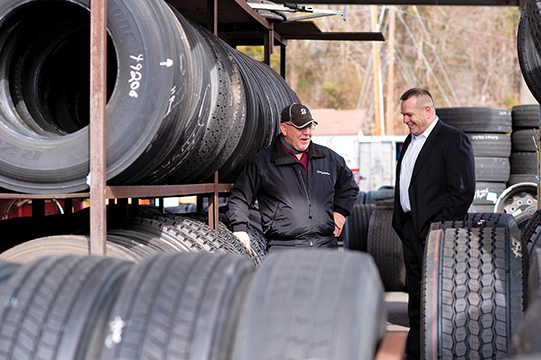
As is tradition, we ask the outgoing chairman to give advice to the incoming chairman. What would be your advice to Jim Ward, who will take office at the conclusion of TCA’s Spring business meeting April 19-20?
First, let me say, Jim Ward will be an excellent chairman. I have worked alongside Jim for many years, whether at Trucking Profitability Strategies (TPS) at the University Georgia, TCA’s TCA Profitability Program, and TCA’s officer group, and have come to respect him tremendously. Jim is seasoned, knowledgeable, and methodical. Jim is ready and eager to take the reins, and I have full confidence he will leave TCA in a better place than he finds it. I just want Jim to know, I will be there to support him. My only piece of advice is for him to enjoy the ride. It seems like you begin one day and it ends the next. Congratulations, my friend!
Thank you, Mr. Chairman, for a wonderful year. Any closing comments to the membership would be welcomed.
I have been most humbled to serve as chairman over the past year. This year has been anything but conventional, and yet I wouldn’t trade my experience or the opportunity to be right where I was. I am excited about the group of leaders that will follow, and I look for TCA to prosper under their guidance and direction.
Lyndon Finney’s publishing career spans over 55 years beginning with a reporter position with the Southwest Times Record in Fort Smith, Arkansas, in 1965. Since then he’s been a newspaper editor at the Southwest Times Record, served five years as assistant managing editor of the Arkansas Democrat-Gazette in Little Rock and from November 2004 through December 2019 served as editor of The Trucker. Between newspaper jobs he spent 14 years as director of communications at Baptist Health, Arkansas’ largest healthcare system. In addition to his publishing career he served for 46 years as organist at Little Rock’s largest Baptist church.




